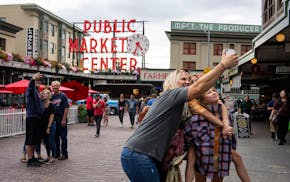Opinion editor's note: Star Tribune Opinion publishes a mix of national and local commentaries online and in print each day. To contribute, click here.
•••
I grew up in a small town surrounded by family farms. My dad, an insurance adjuster who had fulfilled his goal of workplace independence by buying a small agency, would travel the countryside to visit "insureds" and, when necessary, take Polaroid photos of storm damage. On summer days, I'd go with him.
One such day 49 years ago this August, we were parked on the side of a gravel road when a jet flew overhead. "Maybe that's the president's plane," Dad said, referring to Richard Nixon, who was flying away from the nation's capital following his resignation. I realize now that a direct route from Washington to California would not have taken Nixon over southeastern Minnesota, but the hormones that kick up general doubt about the genius of one's parents had yet to kick in, and I was duly impressed. Some fictions are intoxicating to believe.
(Why am I relating this story as we approach the 49-year anniversary of Nixon's resignation, you pause to ask? Well, I wasn't going to wait for a round number. That would be predictable, as you'll discover in August 2024.)
I wasn't in touch with Washington or Watergate in 1974, at age 7, but I'm going to guess we were a Nixon household. We'd go on during my coming-of-age years to become a Ford household and a Reagan household. These are good clues.
A few years after the Nixon "flyover," in 1976, our third-grade teacher had us tape placards to our desks indicating "Ford" or "Carter." (Could such a thing still happen in a classroom?) I was astonished to find my Republican-flavored signage underrepresented. (Could such a thing still happen in rural Minnesota?) But that was because I was new to the understanding that ideas were things to be contested.
There's a reason I'm telling you this story. It's not because I live in a big city now and wish to relate a political transformation. (Although I have been, within limits, as in sync as anyone with our country's Great Sorting, in which what we believe is connected to where we live and vice versa).
No, it's because I still like small towns. Which are at the center of one of the two controversies making this into a summer of discontent for country music. And since I'm about 35 years removed from both small towns and most country music, I wanted to give you at least a sense of my bona fides.
The non-small-town controversy this summer involves a cover of Tracy Chapman's 1988 folk-pop song "Fast Car," which tells a tale of dashed dreams in a big city and its environs. The song has been covered many times, most recently by country singer Luke Combs, who has a hit on his hands. There's complaint in some corners that it required a white man to bring the work of Chapman, a Black woman, to a country audience, but there's no real controversy here, only a true appreciation by Combs of Chapman's song, which has long been celebrated in its own right and which no cover can ever truly supersede.
The other example, the one that relates to small towns, is a Jason Aldean song titled (as luck would have it) "Try That In A Small Town." You might recall that it was Aldean who was performing outdoors in Las Vegas in 2017 when a gunman opened fire from the 32nd floor of a nearby hotel, killing 60. His current song nonetheless takes a pry-it-from-my-cold-dead-hands approach to guns.
Which, apparently, is an entirely acceptable method of resistance compared to others of which the narrator in the song disapproves — the flag-burning, cop-questioning kinds. And he sings that those kinds of people would be, you know, dealt with if they were to, you know, try it in a small town.
That message, along with the fact that the video for the song was shot at the site of a lynching and at least initially included images of Black Lives Matter protests, has led critics to call it racist. Aldean insists it isn't. "There is not a single lyric in the song that references race or points to it — and there isn't a single video clip that isn't real news footage," he wrote on social media. He seems strikingly oblivious, then, to the power of suggestion.
Suggestion is, in fact, at the heart of artistry. Its quality lies in whether it comes across as subtle or heavy-handed. If you're an artist denying you meant to insinuate something most everyone can catch the drift of, it might be a sign you're not working in the purest light.
It's not Aldean's first cultural run-in. Another involved wearing blackface for Halloween. I'm not familiar with his work in general. I know people who are, and they're decent folks. One was at the Las Vegas concert.
Regardless, if they were really looking for a boot-stompin' song that contrasts urban and rural lifestyles, I'd point their attention to "Holler Back," a 2008 effort by a band called the Lost Trailers. I'm not in any way claiming to be a connoisseur of modern country music. This is just one I happen to know. Like so much music made by men, it can't resist a line or two objectifying women. But the song is basically good-humored and feels authentic. (I'll cut the band some slack for subsequently repurposing it as a football theme.)
But I don't want to make my own insinuation that Aldean's song and video should be suppressed. It's so much better that they're out in the open. They offer a set of ideas to be contested. Just as city life does.
For the untenable ideas, sunshine is still the ultimate disinfectant. This is an eternal truth, even though many Americans in recent years have been trying to persuade themselves otherwise. If ever the process is not working as readily as they might wish, it may be a sign that they themselves have not yet found the highest light.

Rash: Tariffs and reckless rhetoric repel international tourists from U.S. travel
Counterpoint: Sale of Allete/Minnesota Power is in the public interest
Readers Write: Ukraine "peace plan," trans rights

